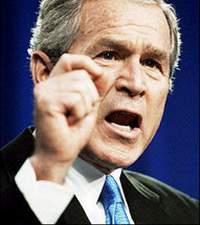USA can hit Venezuela's Chavez below the belt only after 2008
It seemed that George W. Bush’s grand tour of Latin America was supposed to become a breakthrough in the relations of the USA with its southern neighbours. Judging upon the extensive coverage which the tour received worldwide, one may say that the visit of the US president to five countries of the Western hemisphere has become a major political event in the beginning of 2007. However, a closer look at the results that were achieved during Bush’s trip shows that the tour has brought practically no changes in the USA’s relations with the countries of Latin America. The changes could not take place at all.

Signing new agreements or exerting influence on internal affairs of Latin American states was not a goal of George Bush’s tour. The US president visited the five countries to show everyone that the United States had not forgotten about the region, which used to be proclaimed the area of USA’s exclusive interests. It is rumoured that George W. Bush had plans to pay first priority attention to Latin America in the beginning of his first term in the office, but was forced to wrap up the plans after September 11 attacks.
It stands the reason that the tour could not be a crucial political event since it was originally planned as a promotional campaign. The only relevant decision, which was made during the tour, was connected with the ethanol-based fuel agreement signed with Brazil.
On the other hand, Bush’s trip gives food for thought about the format of local policies. For example, the tour has unveiled a huge difference between the Hispanic population and the ruling class of Latin America. It goes without saying that this distinction can be found all over the world, but they do not even try to hide it in Latin America. The leaders of Brazil, Uruguay, Colombia, Guatemala and Mexico enjoyed posing for photographers with the US president. The citizens of those countries took to the streets and did not hesitate to clash with police in an enthusiastic endeavor to express their anger against the US-led foreign policies. It is worthy of note that the leftist movement in Latin America can easily give Bush a hearty welcome without any problems. For instance, Brazilian President Lula Da Silva enjoys great popularity with the left; his recent talks with Bush were very fruitful.
Venezuelan leader Hugo Chavez, who has earned the reputation of Bush's primary adversary, continued to attack the USA during George W. Bush’s tour. Chavez periodically threatens to cut oil supplies to the USA, which he describes as the most murderous and demonic empire in history. On the other hand, even the staunchest allies of the brave Venezuelan president will never say that those threats will ever be fulfilled. Venezuela imports up to 80 percent of its oil to the USA, which means that Chavez’s anti-Americanism is funded by American petrodollars.
Frankly speaking, Bush's most successful tour of Latin America would never be able to solve two major problems which the US administration has in the region. The United States needs a lot of money to cooperate with Latin American countries effectively, which is obviously a problem, because the USA suffers from money shortage for key projects of its foreign policy, like the war in Iraq. Secondly, George W. Bush cannot promise anything to his Latin American colleagues. Bush's popularity in the USA continues to decline, his term in the office is drawing to its end. However, Washington can hit Chavez below the belt if it creates favorable conditions for immigrants. It may probably happen during the era of the new American president after 2008.
Politcom
Translated by Dmitry Sudakov
Pravda.ru
Subscribe to Pravda.Ru Telegram channel, Facebook, RSS!


